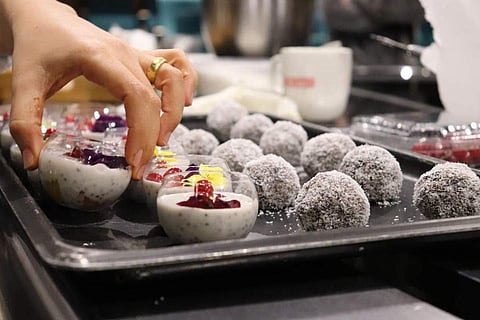World Coconut Day: 5 common misconceptions about coconut hair oil debunked
Throughout history, coconut hair oil has been a treasured natural remedy for hair care. Derived from the tropical coconut fruit, it's renowned for promoting utmost nourishment and moisture to the hair alongside making it strong, shiny, and healthy, earning the title of "miracle elixir".
Despite its popularity, misconceptions persist about its usage. Here are five common misconceptions about using coconut oil for the hair -
Myth 1: Coconut oil leaves hair greasy and weighed down
One of the most common misconceptions is that coconut oil leaves your hair greasy and weighed down. However, this couldn't be further from the truth. Coconut oil is a lightweight, non-greasy oil that's easily absorbed by the hair and scalp. When applied in the right amount, it provides deep nourishment without leaving your hair looking oily. Proper application and moderation are key to experiencing the benefits of 100 per cent pure coconut oil without any unwanted greasy residue. Additionally, coconut oil is a nutritional powerhouse, enriched with essential fatty acids, vitamins, and minerals, infusing your hair with the nourishment it craves. This dual action enhances your hair's innate beauty, ensuring it feels remarkably smooth, looks brilliantly shiny, and exudes a naturally healthy allure while maintaining a light, non-greasy feel.
Myth 2: Limiting coconut oil to long hair only
Another common misconception is that coconut oil is only beneficial for those with long hair. In truth, coconut oil offers its advantages to all hair types, regardless of their length. Short hair can still face challenges such as damage and dryness that coconut oil can effectively address. So, don't underestimate the versatility of this natural remedy — it's not just for the long-haired individuals! Coconut oil is a versatile solution for hair care needs, regardless of your hair's length. Whether your locks are short, medium, or long, it can effectively nourish, repair, and strengthen them, making it a universal choice for healthier hair.
Myth 3: Ineffective for thin hair
Contrary to the belief that coconut oil is ineffective for thin or fine hair, it can work wonders by preventing breakage and promoting a healthier scalp, all the while remaining lightweight and easily absorbed, so it doesn't weigh down fine strands. Regular use of coconut oil can improve the thickness and volume of thin hair, making individual strands stronger and your hair appear thicker and fuller. Additionally, its moisturising properties combat the dryness that often accompanies thin hair, leaving it looking and feeling healthier. So, whether your hair is thin or thick, coconut oil can be a valuable addition to your hair care routine, enhancing its overall health and appearance.
Myth 4: Not recommended for oily scalps
Often, individuals with oily scalps shy away from using coconut oil, worried it might worsen their oiliness. However, coconut oil possesses natural antimicrobial properties that can aid in regulating oil production on the scalp. When used in moderation, coconut oil can effectively manage excess oil while simultaneously nourishing and maintaining scalp health. It serves as a gentle and natural solution for those seeking to strike a balance in scalp well-being. Coconut oil also serves as a natural shield, safeguarding your hair from the damaging effects of UV rays. So, whether your scalp is oily, dry, or somewhere in between, coconut oil can be a valuable ally in achieving a healthy and harmonious hair care routine.
Myth 5: Doesn't work for dandruff
Despite the misconception that coconut oil is ineffective against dandruff or other scalp conditions, it's important to note that coconut oil possesses antifungal and antimicrobial properties that can help alleviate mild dandruff by reducing fungal growth and soothing scalp irritation. Regular use of coconut oil contributes to a healthier scalp, reducing dandruff and the associated discomfort. It can be a valuable part of a holistic approach to managing mild dandruff. However, severe dandruff cases may require specialised treatment in addition to coconut oil. It's essential to consult with a dermatologist for severe or persistent dandruff issues to determine the best course of action for your specific needs.
Also read: Basic workouts to suit different age groups
In summary, coconut hair oil stands as a versatile and invaluable addition to your hair care regimen. By dispelling these widespread misconceptions and grasping its true merits, you can unlock the full potential of coconut oil to nourish, fortify, and revitalise your hair, bestowing upon it a radiant and healthy appearance. Bid farewell to the misconceptions and welcome the genuine benefits of coconut hair oil into your daily routine. Your hair will thank you for it.
With inputs from Meera, the personal care brand from the house of CavinKare.
Related Article
EXCL: Singer-composer Pranaay on the importance of stepping out of one's comfort zone as an artiste
Twinkle Khanna completes her master's degree from the University of London, Akshay Kumar reacts
Kriti Sanon is a vision of grace and style as she dons a sari lehenga by Ritika Mirchandani
Michael Jackson biopic to explore 'good, bad and ugly' of late icon
R. Madhavan to be next President of FTII, India's premier film institute

